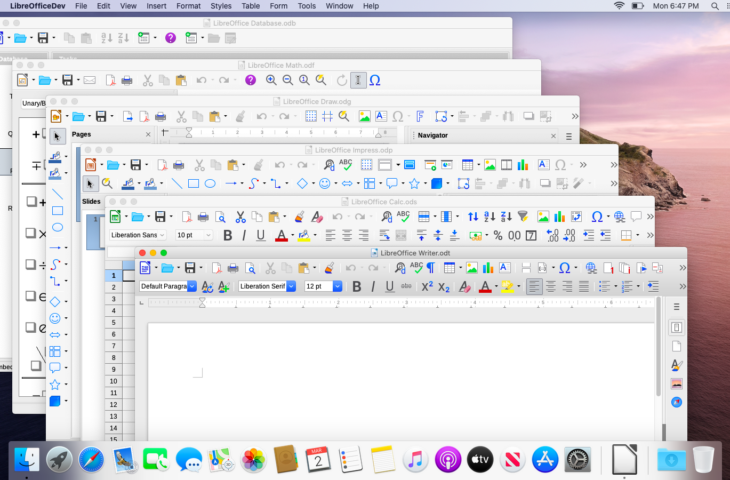
Been a happy user on a 2010 MacBook Pro since 2010
The Document Foundation Wiki has a page about LibreOffice Vanilla for Mac, which explains the differences. There are some differences in functionality. LibreOffice Vanilla for Mac omits some Java-based features. The upshot is that Base cannot use the HSQLDB engine, and is lacking some reporting features. Java-based extensions won't work either. When I started using Linux as well OpenOffice appeared so I started using that at 1.0, because it would work across Mac, Win and Linux. I moved to LibreOffice at version 3.3, and still have an.
Just got a new M1 Mac Mini with Big Sur 11.1
- Microsoft Office with native Apple Silicon M1 support arrives By William Gallagher Dec 15, 2020 Microsoft's main app collection of Word, Excel, PowerPoint, and Outlook in Microsoft 365 have all.
- And there’s more to come: an optimised version of LibreOffice for Apple’s M1-based Macs is being developed, thanks to work from Collabora Productivity, a company in LibreOffice’s ecosystem. And more improvements for LibreOffice on macOS Big Sur are on the way – stay tuned!
- OpenOffice.org is both an Open Source product and a project. The product is a multi-platform office productivity suite. It includes the key desktop applications, such as a word processor, spreadsheet, presentation manager, and drawing program, with a user interface and feature set similar to other office suites.
Apache_OpenOffice_4.1.8_MacOS_x86-64_install_en-US
Got this in a message when I tried to run it: 'OpenOffice' cannot be opened because the developer cannot be verified
Tried again and noticed that perhaps I should have tried 4.0.1, so I downloaded this:
Apache_OpenOffice_4.0.1_MacOS_x86_install_en-US
Microsoft Office On Apple M1
This time I got: 'OpenOffice' needs to be updatedScreenshots of messages attached.

- → Open Issues
This page describes how to set up a build environment for LibreOffice on macOS 10.14.4. Building master requires Xcode 11.3 or later, which requires macOS 10.14.4 or later.
Prerequisites
- Install Xcode from the App Store. The intent is that LibreOffice will always be buildable with the current Xcode on current macOS. Right after a new Xcode version is released, or after a new macOS version is released, there might be a few days while that is not true. Just be patient in that case. Using older Xcode versions on older macOS versions might also work. What you are absolutely not expected to do is to specifically download some old Xcode version or a separate old SDK and use those.
- Run Xcode at least once (you don't need to open or create any project)
- If you are planning to work on the parts of LibreOffice that are implemented in Java, mainly the HSQLDB embedded database in Base, you need to download and install a JDK (Java SE Development Kit): Oracle's Java SE Development Kit. But that is entirely optional. If you want to avoid Java, just use the --without-java option in your autogen.input or on the autogen.sh command line, when you get that far.
Notice: according to http://document-foundation-mail-archive.969070.n3.nabble.com/About-building-on-Apple-Silicon-M1-tt4298988.html, everything should be ok to build with mac containing processor Apple Silicon M1 except a known issue with in-process JVM (see https://lists.freedesktop.org/archives/libreoffice/2020-December/086490.html)
Building
See Development/lode.
Building Tips
See platform-independent tips at Development/GenericBuildingHints
Building in a ssh session

In some cases it seems that if you are building in a ssh session, some unit tests fail unless you also have a windowing session open to the machine, either on the physical console or through Screen Sharing.
Performance
Building LibreOffice takes time, a lot of time. Exactly how much depends on how powerful your machine is. But there are tools you can use to speed-up things.
ccache
ccache is short for compiler cache - and it is exactly that. It saves tons of time by not running the actual compiler when little has changed in the source codebetween two builds. But note that unless you explicitly do 'make clean' often, that is not typically the case, and using ccache just because you think it maybe helps is not a good idea.
Get it here: [1]
Build it like this:
You will also need to ensure the following is defined, e.g. in .bash_profile in your home folder, if using ccache (see Development/Building LibreOffice with Clang for full details), otherwise clang will report errors and show unnecessary warnings:
The default cache limit (5 GB) is not large enough to be useful for a LibreOffice build, but you can increase it, for instance to 30 GB:
To check what the current cache limit is, and see ccache statistics, run it with the -s command-line option:
Upgrading to a recent macOS on unsupported machines

Using various unofficial third-party tools it might be possible to run newer macOS versions on machines that are older than what that macOS version supports. If you need that, search for it. It is not relevant to duplicate such information here.
Libreoffice On Mac
Don't bother building the ODK
It is likely that you don't need to build the 'ODK' (Office Development Kit), especially as building that would require installing one more dependency: doxygen. Use the --disable-odk option in your autogen.input or on the autogen.sh command line.
Libre For Mac
See also
Libreoffice Para Mac M1
